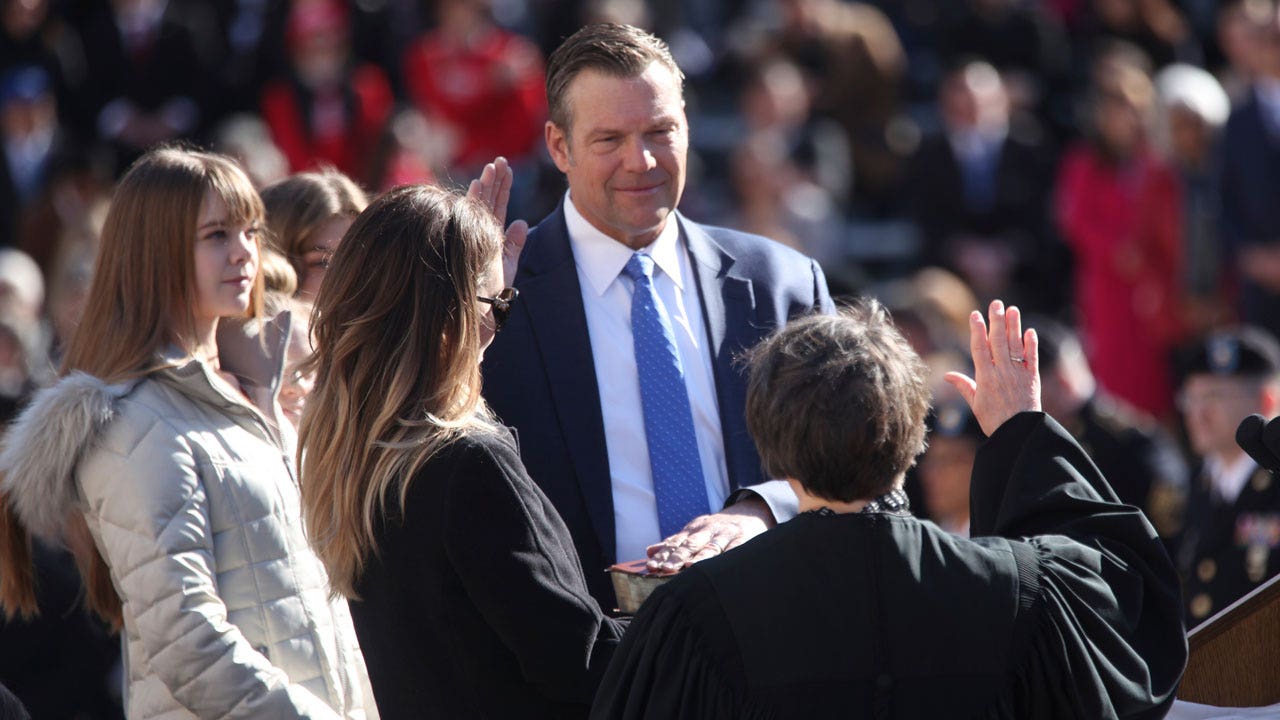
New Kansas AG Kobach wants state Supreme Court to reconsider abortion ruling

Kansas’ anti-abortion Republican attorney general is asking the state’s highest court to reconsider a landmark decision protecting access to abortion months after a decisive statewide vote affirming abortion rights.
Attorney General Kris Kobach said Wednesday that one reason for the Kansas Supreme Court to reconsider its 2019 ruling is the U.S. Supreme Court’s decision in June overturning Roe v. Wade and declaring that the U.S. Constitution doesn’t grant a right to abortion access. The Kansas court is set to consider that issue and others in two abortion cases on Jan. 30, though Kobach said he is likely to ask for a few weeks’ delay because he took office only Monday.
The Kansas Supreme Court declared in 2019 that access to abortion is a matter of women’s bodily autonomy and a ‘fundamental’ right under the state’s own Bill of Rights. The decision came in the first stage of a lawsuit challenging a 2015 state law banning the most common second-trimester abortion procedure, and the court is now considering the question of whether that not-yet-enforced law violates the state constitution. It also is considering the validity of extra health and safety regulations for abortion providers.
In August, Kansas voters in August rejected a proposed amendment to the state constitution pushed by Republican legislators to overturn the 2019 Kansas court decision and allow lawmakers to ban abortion. That 2019 decision inspired two self-described abortion ‘abolitionists’ to protest Wednesday at the Statehouse before and during Kansas Supreme Court Justice Marla Luckert’s annual State of the Judiciary address to legislators.
Democratic state Rep. John Carmichael, a Wichita attorney and abortion rights supporter, said he doubts the Kansas Supreme Court will reverse itself. Following the vote against the anti-abortion measure in August, six of the seven justices, including Luckert, faced yes-or-no votes in November on whether they would stay on the bench for another six years, and all were retained by wide margins.
‘The court made the right decision based on the facts and the law, and to that extent, yes, the people vindicated that decision,’ Carmichael said, though he added, ‘I don’t expect that to impact the court in its judicial decision-making.’
Kobach is inheriting the state’s defense of existing abortion restrictions from his predecessor, Republican Derek Schmidt, who left office Monday after losing the race for governor in November.
Kobach noted not only the U.S. Supreme Court’s ruling in June but also an Iowa Supreme Court decision the week before, overtuning its own 2018 ruling that protected abortion rights.
‘One of the things that affects any court reconsidering any precedence is intervening events,’ Kobach said. ‘There have been intervening events.’
The two Statehouse protesters, Clifton Boje and Kevan Myers, from the Kansas City, Kansas, area, had signs calling for banning abortion and describing themselves as ‘ambassadors of Jesus Christ.’
Myers argued that the Kansas Supreme Court’s 2019 decision violates a provision of the state’s Bill of Rights guaranteeing ‘natural rights,’ including ‘life, liberty, and the pursuit of happiness.’ The court said in 2019 that the provison protected bodily autonomy.
As lawmakers admitted Luckert and her fellow justices into the House chamber for her address, Myers said, ‘Oh, friends, there’s no right to murder.’
Afterward, Luckert told reporters after her speech that she heard the protesters’ messages but, ‘I don’t take an opinion poll before I make my decision.’
Asked whether August’s statewide vote vindicated the court, Luckert said, ‘Vindication is not a part of my job. My job is to uphold the law, and regardless of what that vote had been, I made my legal decision based on the law.’
